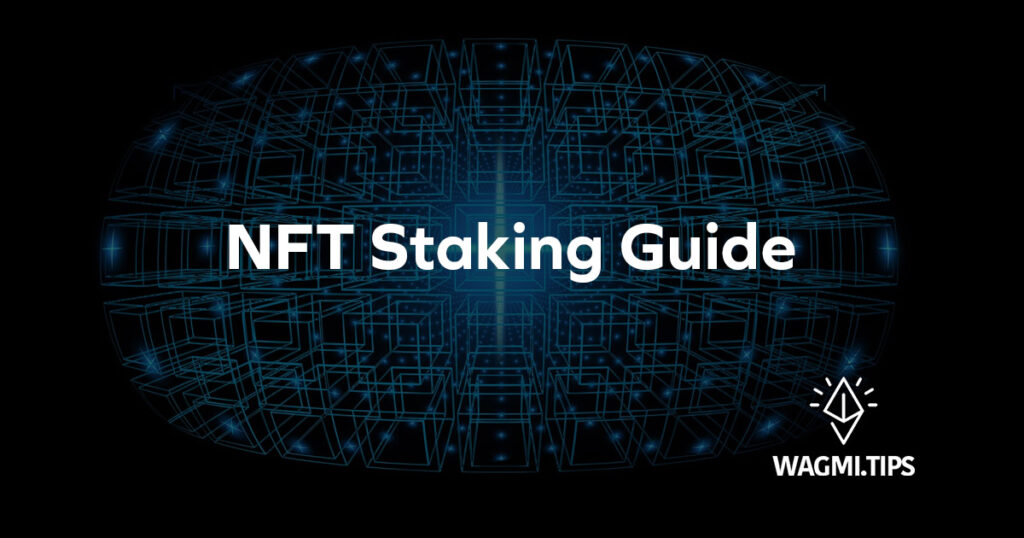NFT Staking Basics – What You Need To Know
NFT staking is very popular among NFT projects as a utility to attract investors. But what is NFT staking exactly? In this guide, we cover the essentials of NFT staking and review some popular projects with NFT staking.

Disclaimer: This article is for information purposes only. Wagmi.tips will not be responsible for any losses or gains incurred as a result of staking your NFTs or investing in any NFTs. The contents of this article does not constitute financial advice. Always do your own research.
Table of Contents
What Is NFT Staking?
Back in the DeFi era, cryptocurrency owners could deposit their tokens into a liquidity pool (aka ‘staking’) and get a reward, usually in the form of the DeFi platform’s token or another cryptocurrency. The depositor has to lock up their tokens for a fixed period of time and is promised a certain yield percentage.
Today, NFTs are not as illiquid as before. Normally, you would have to sell your NFT to someone else in order to make money but now you can also stake NFTs on DeFi platforms and earn the same type of yield.
How Does NFT Staking Work?
Generally, you would send your NFT to a platform that supports staking and lock it in a liquidity pool. Stakers can earn rewards such as platform tokens or other NFTs, according to the rules laid out in the smart contract. Staking platforms such as NFTX only support a limited number of NFT collections, so you would want to check what NFTs can be staked beforehand.
Why Offer NFT Staking For Your Project?
At its core, NFT staking is a way to reward investors and collectors, by giving them utility tokens for owning and staking their NFTs. As you can imagine, this can drive up the value of your project. You can skyrocket this value further by offering utility token-specific perks such as whitelist opportunities, merchandise and airdrops.
It is also a great way to increase scarcity for your NFTs. Staked NFTs are often locked in a vault so they cannot be sold or bought, thus making the remaining unstaked NFTs more valuable.
Risks Of NFT Staking
As with any investment, there are many risks to be aware of so always do your research before making any moves. NFT staking comes with a fair share of potential risks such as:
- Phishing websites – There are many websites trying to impersonate popular NFT staking projects. When you interact with the contract on the fake website, it may drain your wallet.
- Useless reward token – Sometimes the reward token provided has not enough liquidity on DeFi exchanges, so you can’t even turn a profit on your rewards.
- Project rug – Some projects may promise certain utilities or benefits that come from the staking reward. However, if the project fails to deliver on its promises, you are essentially left with a useless reward token.
- Lockup period – Sometimes when your NFT is locked up in the staking vault, you may miss out on golden opportunities to trade your NFT for profits.
Popular NFT Staking Projects
So where can I stake my NFTs? Here are some popular NFT staking platforms and projects so you can put your NFTs to good use:
- NFTX – NFTX.io is where you can stake a lot of NFTs from popular collections to earn yield. Stakers are rewarded a fungible token called vToken which is tradable and also can be used to redeem specific NFTs from a vault.
- Polychain Monsters – Polychain Monsters is a popular cross-chain digital collectible and gaming ecosystem. When you collect Polychain Monster NFTs, you can stake them and earn $PMON. $PMON is used as the token that runs the Polyverse: A hyper-deflationary asset used for booster pack openings, farming and the upcoming play-to-earn games.
- Wolf Game NFT – The boom of play-to-earn NFT games have given rise to projects like Wolf Game. The game uses an on-chain risk protocol, where players can risk their tokens but also stand a chance to win significant rewards. Players can stake their Sheep NFT to earn $WOOL tokens, which is an important part of gameplay, growing resources, breeding sheep and wolves, and of course earning on the game.
Summary
Nowadays, many of the projects that offer staking mechanisms are NFT games or big budget play-to-earn games. While staking can be a great form of NFT utility, staking mechanisms and smart contracts often add extra complexity and costs for NFT creators. Will staking be the trend for all NFT projects moving forward? Only time will tell.
